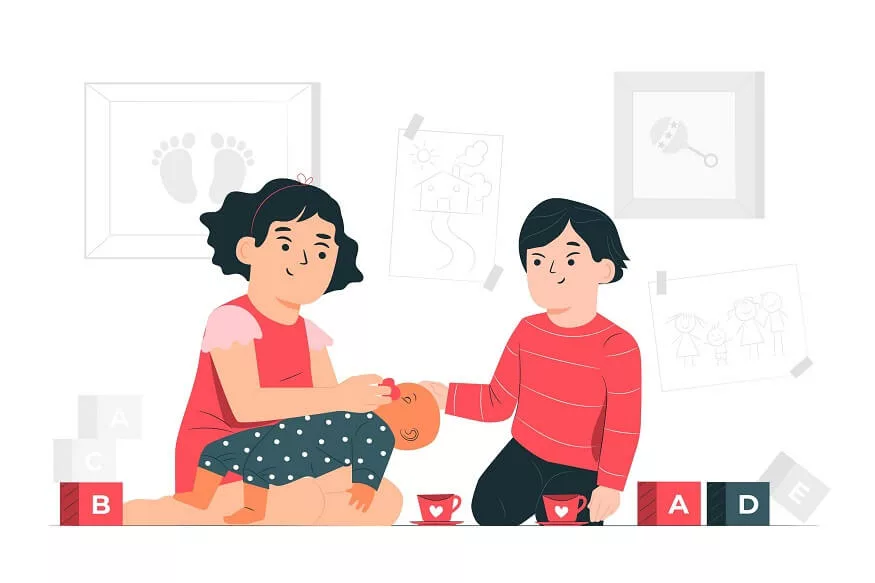The Emergence of social and emotional skills stands as a crucial milestone. Sharing, a behaviour often lauded in society, can become a complex concept for toddlers to grasp. In this guide, we delve into the roots of toddlers’ reluctance to share, understanding the intricacies of their social development, and offer strategies to foster cooperation and the joy of sharing.
Sharing as a Developmental Milestone
Toddlers, typically aged between one and three years, are at a critical stage of development marked by rapid cognitive, emotional, and social growth. During this period, children are beginning to assert their autonomy and explore their newfound independence. The concept of ‘mine’ emerges as they become more aware of their possessions and personal space. Sharing, however, involves relinquishing control and sharing ownership, a notion that challenges their burgeoning sense of self.
Also Read: Building Emotional Intelligence In Children: Skills, Importance and Activities
Understanding Social and Emotional Development in Infants
- Foundations of Social Skills: Social development in infants is a multifaceted journey. It begins with the formation of attachments to caregivers and gradually extends to interactions with peers. Through these interactions, children start to develop the foundation for social skills.
- Building Empathy: Empathy, the ability to understand and share the feelings of others, starts to bloom during infancy. This burgeoning sense of empathy is fundamental to the later development of prosocial behaviours, including sharing.
- Sense of Identity: As toddlers begin to comprehend their individuality, they may grapple with the concept of ownership. Sharing, in their eyes, can sometimes feel like relinquishing a part of themselves.
Why Toddlers Struggle to Share
Here are some possible options why toddlers struggle to share:
Limited Perspective-Taking Skills
Toddlers are still developing their ability to understand situations from the perspective of others. Sharing requires this perspective-taking skill, which can be challenging for young children.
Territorial Instincts
The notion of ownership and territorial instincts are pronounced in toddlers. Sharing may clash with their instinct to guard what they perceive as ‘theirs’.
Language Limitations
Toddlers may not have the vocabulary to express their emotions effectively. When faced with sharing, their frustration or reluctance might manifest in tears or resistance.
Testing Boundaries
Testing boundaries is a normal part of a toddler’s development. They are figuring out what is acceptable and what is not, and sometimes, withholding a toy is a way to assert control.
Also Read: Cultivating Compassion: Teaching Kids to Be Kind to Themselves and Others
Psychological Factors Influencing Sharing Behaviour
Several psychological factors contribute to toddlers’ reluctance to share. The first is egocentrism, a characteristic feature of early childhood development. Toddlers may struggle to perceive things from others’ perspectives, making it difficult for them to understand the importance of sharing for collaborative and social play.
Additionally, the fear of loss plays a significant role. Toddlers may perceive sharing as a threat to their possessions or control over a situation, triggering anxiety or discomfort. This fear is rooted in their limited understanding of abundance and the belief that sharing implies giving something up permanently.
Furthermore, toddlers are still developing their emotional regulation skills. They may experience heightened emotions such as possessiveness, frustration, or even jealousy, leading to resistance when asked to share. Recognising and addressing these emotions is essential for creating an environment that promotes healthy sharing behaviours.
Effective Strategies to Encourage Cooperation and Sharing
- Model Sharing Behaviour: Children learn by observation. Demonstrate sharing in your own interactions with them, be it sharing a snack or taking turns during play. Your actions serve as a powerful model for their behaviour.
- Use Positive Reinforcement: Praise instances of sharing. Positive reinforcement, in the form of verbal praise or a hug, reinforces the idea that sharing is commendable and brings positive attention.
- Teach Turn-Taking: Introduce the concept of taking turns. This approach helps toddlers understand that they will eventually get their turn, easing the apprehension of letting go of a toy.
- Empathise and Validate Feelings: Acknowledge your toddler’s feelings. If they are reluctant to share, validate their emotions by saying, “I can see you really like that toy.” This recognition helps them feel understood.
- Introduce Sharing Through Play: Engage in activities that naturally involve sharing. Games like passing a ball or collaborative drawing provide opportunities for shared enjoyment.
- Create a Sharing Routine: Establish a routine where sharing is a norm. For example, designate a specific playtime or activity where children are encouraged to share toys.
- Use Stories and Imaginary Play: Storytelling can be a powerful tool. Share stories about characters who exhibit generosity and the positive outcomes of sharing. Incorporate imaginative play scenarios that involve sharing.
- Set Realistic Expectations: Understand the developmental stage of your toddler. While encouraging sharing, it’s also crucial to recognise that complete mastery of this skill might take time.
- Provide Choices: Empower toddlers with choices. Instead of saying, “Share your toy,” offer options like, “Would you like to share this toy or that one?” This way, they feel a sense of control.
- Celebrate Small Wins: Acknowledge and celebrate every instance of cooperation and sharing. Reinforce the idea that sharing leads to positive outcomes and a pleasant playtime.
Also Read: Effective ways on teaching children the joy of sharing
The Journey Towards Cooperation
- Promoting Autonomy: Encourage a sense of autonomy. When toddlers feel secure in their independence, they are more likely to willingly engage in sharing.
- Create a Sharing-friendly Environment: Ensure there are ample toys to go around. Having duplicates of popular toys can reduce conflicts and make sharing more seamless.
- Encourage Group Activities: Group activities foster a sense of community. Whether it’s a playdate or a toddler group, the shared experience can contribute to a more sharing-oriented mindset.
- Be Patient and Supportive: Patience is key. Understand that sharing is a skill that develops gradually. Support your toddler through the process, offering reassurance and gentle guidance.
Also Read: 10 Helpful Tips for Parents to Handle Naughty Kids
In the beautiful chaos of toddlerhood, teaching the art of sharing is not just about promoting a societal norm but fostering a sense of generosity, empathy, and connection. By approaching the reluctance to share with understanding and implementing effective strategies, EuroSchool guides toddlers towards a path of cooperation and joyful interaction. The journey is not without its challenges, but each small act of sharing is a step towards a more interconnected, compassionate, and socially adept future. As toddlers navigate the intricate landscape of relationships, the seeds planted in these formative years will bear the fruits of a generous and sharing-oriented worldview.










